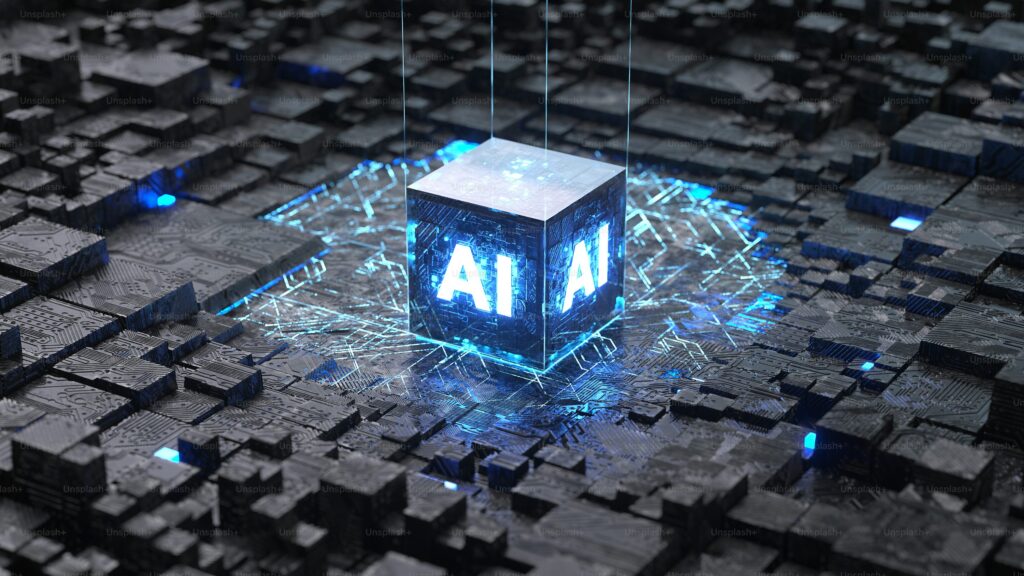The Future of Artificial Intelligence: Transforming Industries and Shaping Our World
The Future of Artificial Intelligence: One of the 21st century’s most revolutionary technologies, artificial intelligence (AI) has moved beyond science fiction. AI has the potential to transform almost every industry, from enabling voice-activated assistants and self-driving cars to transforming healthcare and banking. Even if AI’s full potential is still being realized, its effects on business and society are significant and wide-ranging.
What is Artificial Intelligence?
The ability of machines to carry out tasks that normally call for human intelligence is known as artificial intelligence. Learning from data, seeing trends, comprehending language, resolving issues, and even displaying social behavior are all included in this. Large datasets and algorithms power AI systems, which enable them to produce insights, make forecasts, and support human decision-making.
AI can be divided into three main types:
- Artificial Narrow Intelligence (ANI): This type lacks general intelligence but is made to excel at a specific task (such as language translation or facial recognition). ANI is used in the majority of AI systems nowadays, such as recommendation engines and virtual assistants.
- Artificial General Intelligence (AGI): AGI is a potential type of artificial intelligence that would essentially have human-like cognitive capacities and be able to carry out any intellectual task that a human can. Although it has not yet been achieved, AGI is still a goal that researchers are pursuing.
- Artificial Superintelligence (ASI): ASI would surpass human intelligence across all domains, potentially leading to unforeseen advancements. ASI is a theoretical concept and raises ethical concerns about AI’s future.

Applications of Artificial Intelligence Across Industries
1. Healthcare :
AI is improving diagnoses, forecasting patient outcomes, and customizing treatment regimens in the healthcare industry. AI-powered imaging systems, for instance, help radiologists detect diseases early on. More precise diagnoses can be made by using machine learning algorithms to evaluate patient data and find patterns that human eyes might overlook. Additionally, AI-powered drug discovery expedites the study and creation of novel medications, which could save lives.
2. Finance :
The finance industry has made substantial use of AI. For example, algorithmic trading makes split-second decisions to purchase or sell assets by using AI to examine massive datasets in real time, maximizing profit. Machine learning is used by fraud detection systems to find questionable trends in transaction data, safeguarding both financial institutions and customers. AI-powered chatbots for customer support and solutions for managing personal finances also provide clients with round-the-clock support and tailored financial guidance.
3.Retail :
Through supply chain optimization and consumer engagement personalization, AI is improving the retail experience. While demand forecasting aids merchants in efficiently managing inventories, recommendation engines make product recommendations based on browsing and purchase history. Customers may shop without standing in line thanks to computer vision-powered automated checkout systems, which speed up and simplify the buying process.
Also read : The Evolution and Future of Software Development
4.Manufacturing :
AI has significantly improved manufacturing through quality control and predictive maintenance. AI can predict equipment faults before they occur by evaluating sensor data, which lowers maintenance expenses and downtime. Additionally, manufacturers are using more and more AI-powered robots to perform repetitive tasks, which improves production accuracy and speed.
5. Transportation :
One of the most well-known applications of AI is in self-driving cars. These cars use computer vision and deep learning to assess their surroundings, make decisions, and drive safely. Additionally, AI streamlines supply chain management and logistics, assisting businesses in cutting expenses, improving delivery times, and using less gasoline.
Also Read : Becoming a Full Stack Developer: The Ultimate Guide to Mastering Frontend and Backend Skills
6. Education :
AI is revolutionizing education by offering individualized instruction. Intelligent tutoring programs provide tailored content to assist students understand difficult ideas by adjusting to their unique learning preferences. Additionally, administrative duties are automated by AI-based solutions, freeing up teachers to concentrate more on instructing and guiding pupils.

Education and Skills Required for an Artificial Intelligence Engineer
Becoming an AI engineer requires a combination of academic qualifications, technical skills, and hands-on experience. Here are the core educational pathways and skills necessary:
Educational Background :
- Bachelor’s Degree: Most AI engineers have a background in fields like computer science, data science, engineering, information technology, or mathematics.
- Advanced Degrees (Optional but Advantageous): A master’s degree or PhD in AI, machine learning, or a related field can provide deeper theoretical knowledge and open doors to more advanced positions.
Technical Skills :
- Programming Skills:It is crucial to be proficient in languages like Python, Java, R, and C++. Python’s large library and active community make it a popular choice for AI development.
- Mathematics and Statistics: Since they are crucial to creating and comprehending AI models, a solid foundation in linear algebra, calculus, probability, and statistics is required.
- Machine Learning and Deep Learning: knowledge of computer vision, natural language processing (NLP), neural networks, and machine learning methods.
- Big Data Technologies: knowledge of huge dataset handling tools such as Hadoop, Spark, and Apache Kafka.
- Data Wrangling and Visualization: Skills in cleaning, transforming, and visualizing data using tools like Pandas, Matplotlib, and Tableau.
Core Competencies :
- Problem-Solving and Critical Thinking: Because AI requires addressing complex problems and coming up with innovative solutions, AI engineers need to be highly skilled in problem-solving.
- Communication and Collaboration: AI engineers must successfully convey technical concepts to stakeholders who are not technical because AI projects are frequently interdisciplinary.
- Adaptability and Continuous Learning: Continuous learning and staying up to date with the most recent developments in AI research and technology are crucial because AI is a rapidly evolving field.
Practical Experience :
- Projects and Internships: Building a strong portfolio requires practical experience with real-world projects, hackathons, or internships.
- Certifications and Online Courses: Employability can be improved by taking advantage of specialized courses and certifications in AI, ML, and data science offered by online platforms such as Coursera, Udacity, and edX.
Ethical Concerns and Challenges
- Privacy: Large volumes of data, some of which may contain sensitive personal information, are necessary for AI systems to function. Protecting data privacy is important yet difficult.
- Bias and Fairness:The objectivity of AI systems depends on the quality of the data they are trained on. Biased historical data may inadvertently be reinforced by AI, producing unjust lending, hiring, and law enforcement results.
- Job Displacement: AI-powered task automation could result in employment losses in several industries. To lessen these effects, the workforce must be prepared for an AI-driven future.
- Security Risks: AI systems could be the target of cyberattacks as they develop in sophistication. For instance, autonomous systems may be susceptible to hacking, raising security issues.
The Future of Artificial Intelligence
AI has a bright future ahead of it, with significant ramifications. AGI, which would allow robots to comprehend, learn, and react with human-like intelligence, might arise as AI research progresses. AI capabilities could be further enhanced by domains like quantum computing, which could solve issues that are beyond the capability of modern computers. Furthermore, AI is probably going to be essential in solving global issues like illness prevention, energy conservation, and climate change.
Conclusion :
Our understanding of how artificial intelligence might change the world is still developing. Even though there are still obstacles to overcome, adopting moral values, protecting data privacy, and striving for justice and openness can optimize AI’s advantages. As the AI era progresses, cooperation between academics, decision-makers, and business executives will be essential to crafting a future in which AI advances society. AI is still in its early stages of development, and its effects on humans will only grow as it presents both new possibilities and difficulties.


